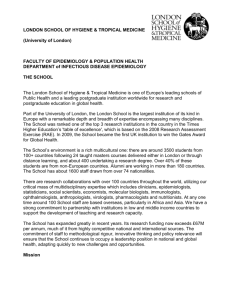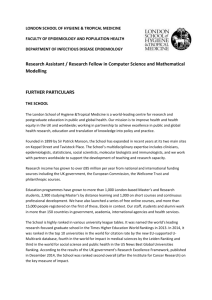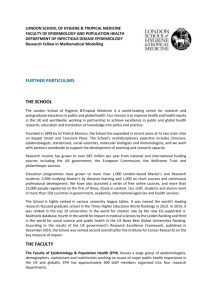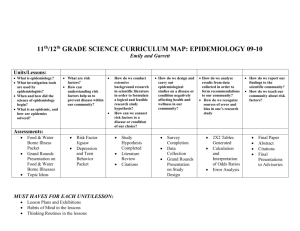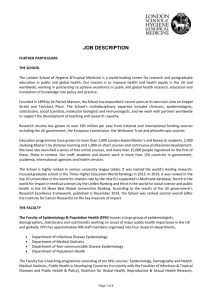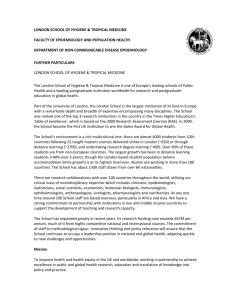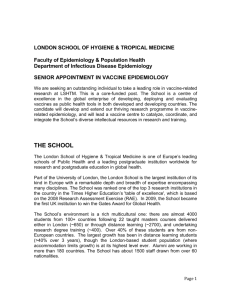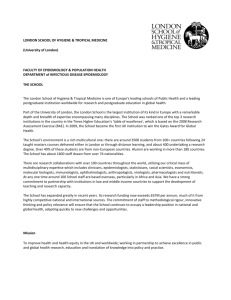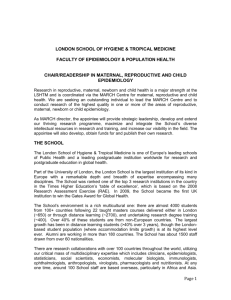LONDON SCHOOL OF HYGIENE & TROPICAL MEDICINE
advertisement
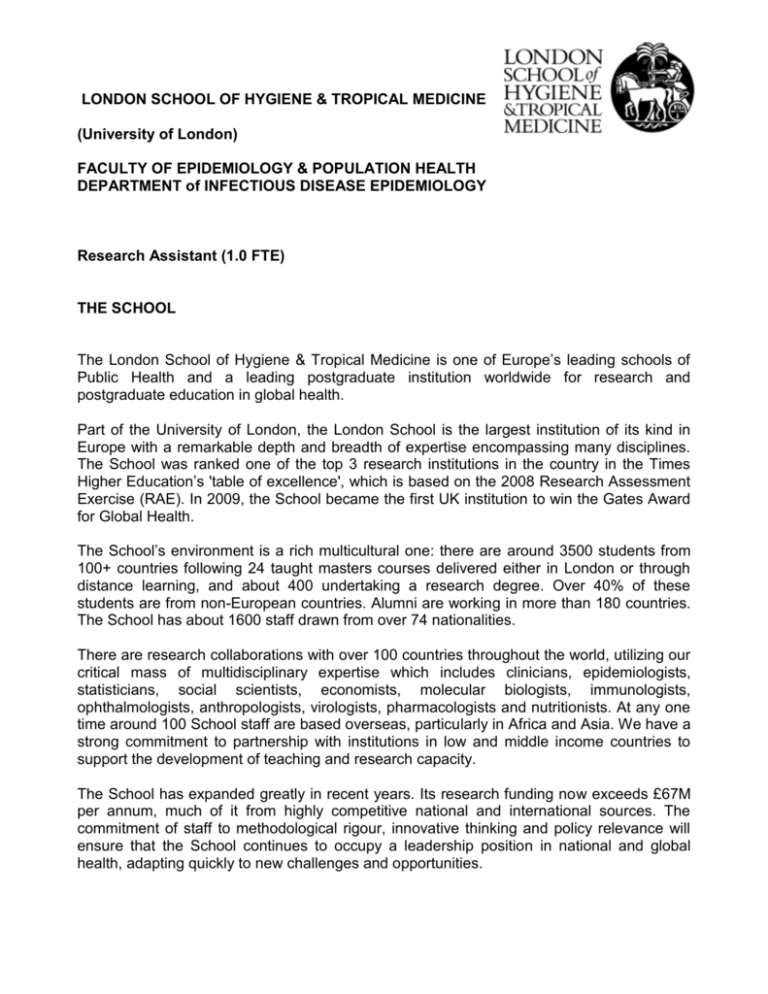
LONDON SCHOOL OF HYGIENE & TROPICAL MEDICINE (University of London) FACULTY OF EPIDEMIOLOGY & POPULATION HEALTH DEPARTMENT of INFECTIOUS DISEASE EPIDEMIOLOGY Research Assistant (1.0 FTE) THE SCHOOL The London School of Hygiene & Tropical Medicine is one of Europe’s leading schools of Public Health and a leading postgraduate institution worldwide for research and postgraduate education in global health. Part of the University of London, the London School is the largest institution of its kind in Europe with a remarkable depth and breadth of expertise encompassing many disciplines. The School was ranked one of the top 3 research institutions in the country in the Times Higher Education’s 'table of excellence', which is based on the 2008 Research Assessment Exercise (RAE). In 2009, the School became the first UK institution to win the Gates Award for Global Health. The School’s environment is a rich multicultural one: there are around 3500 students from 100+ countries following 24 taught masters courses delivered either in London or through distance learning, and about 400 undertaking a research degree. Over 40% of these students are from non-European countries. Alumni are working in more than 180 countries. The School has about 1600 staff drawn from over 74 nationalities. There are research collaborations with over 100 countries throughout the world, utilizing our critical mass of multidisciplinary expertise which includes clinicians, epidemiologists, statisticians, social scientists, economists, molecular biologists, immunologists, ophthalmologists, anthropologists, virologists, pharmacologists and nutritionists. At any one time around 100 School staff are based overseas, particularly in Africa and Asia. We have a strong commitment to partnership with institutions in low and middle income countries to support the development of teaching and research capacity. The School has expanded greatly in recent years. Its research funding now exceeds £67M per annum, much of it from highly competitive national and international sources. The commitment of staff to methodological rigour, innovative thinking and policy relevance will ensure that the School continues to occupy a leadership position in national and global health, adapting quickly to new challenges and opportunities. Mission To improve health and health equity in the UK and worldwide; working in partnership to achieve excellence in public and global health research, education and translation of knowledge into policy and practice. THE FACULTY The Faculty of Epidemiology & Population Health (EPH) houses a large group of epidemiologists, demographers, statisticians and nutritionists working on issues of major public health importance in the UK and globally. EPH has approximately 330 staff members organised into four research departments. Department of Infectious Disease Epidemiology Department of Medical Statistics Department of Non-communicable Disease Epidemiology Department of Population Health The Faculty has a teaching programme consisting of ten MSc courses: Epidemiology, Demography and Health, Medical Statistics, Public Health in Developing Countries (run jointly with the Faculties of Infectious & Tropical Diseases and Public Health & Policy), Nutrition for Global Health, Reproductive & Sexual Health Research, Veterinary Epidemiology (run jointly with the Royal Veterinary College), Global Mental Health (run jointly with Kings College London - Institute of Psychiatry) and the Distance Learning courses in Epidemiology and Clinical Trials. The Faculty also has approximately 149 research students studying for an MPhil, PhD or DrPH degree. The Dean of Faculty is Professor John Edmunds. THE DEPARTMENT The Department of Infectious Disease Epidemiology (head; Carine Ronsmans) conducts research on the epidemiology and control of infectious diseases of public health importance and also on maternal and neonatal health. Work is carried out both in developing countries and in industrialized countries including the United Kingdom. Research ranges from ecological studies of variations in disease frequency in different populations, through observational case-control and cohort studies to define risk factors for disease, to randomized controlled trials to test the impact of specific preventive and curative interventions. The Department has major field research programmes in Malawi, Tanzania, Zambia, Ghana, Brazil and Europe and numerous collaborative projects in other countries in Africa, Asia and Latin America. Major interests are in the epidemiology and control of HIV and other sexually transmitted diseases, tuberculosis and other mycobacterium, malaria and other tropical parasites, hepatitis, measles and other vaccine-preventable diseases, respiratory diseases and gastro-intestinal infections. The Department is home to the Tropical Epidemiology Group, and a large research programme on maternal and neonatal health. The Department includes both medical and statistical epidemiologists, and there is considerable interest in methodological work, including research on statistical methods, transmission models, genetic epidemiology and immuno-epidemiology. There are strong collaborative links with other departments within the Faculties of Infectious and Tropical Diseases, particularly the Clinical Research and Immunology Departments. THE POST Job Description Post: Research Assistant in Perinatal Epidemiology (Global estimates of low birth weight and stillbirth rates) Grade: G5 Research Assistant Responsible to: Professor Joy Lawn, IDE, EPH Job summary The post holder will be a Research Assistant in Perinatal Epidemiology, undertaking work relating to estimates of low birth weight and stillbirth rates, within the Department of Infectious Disease Epidemiology at LSHTM. The post-holder will be based at LSHTM working closely with Professor Joy Lawn and Dr Hannah Blencowe, and also collaboratively with other members of the low birth weight and stillbirth global estimates teams, including UNICEF, WHO and the Saving Newborn Lives (Save the Children) teams. The successful applicant will work on supporting the technical work of the low birth weight and stillbirth global estimates team, including undertaking systematic reviews, updating the low birth weight and stillbirth databases, and supporting in the analysis, write-up and dissemination of the work. Responsibilities Research Work as part of the low birth weight and stillbirth global estimation team, and support the technical work of Professor Joy Lawn and Dr Hannah Blencowe. Conduct systematic reviews of published and unpublished data sources, to update prevalence data relating to low birth weight and stillbirth rates. Help update and finalise the global low birth weight and stillbirth prevalence databases. Contribute to drafting and reviewing reports, presentations, and communications outputs as required. Assist with drafting manuscripts for peer reviewed journals to be published in a range of target journals. Collaborate with the line manager as required. Teaching Contribute to teaching of epidemiological methods for our post-graduate students and short courses by assisting with practical classes. Citizenship Contribute to the general activities of the Department, Faculty and School that help promote the objectives of the London School of Hygiene and Tropical Medicine. To act at all times in accordance with the highest professional standards, and to ensure that these are maintained in the delivery of all aspects of research and teaching. Any other work considered appropriate by the Department Head and Dean of Faculty. Person Specification Essential Criteria MSc in Epidemiology or equivalent Interests in reproductive, maternal and newborn health Previous experience in undertaking systematic reviews Experience in database management, including the use of EXCEL Previous experience in the use of Endnote referencing software. Good inter-personal skills with an ability to work co-operatively in a multidisciplinary setting Excellent written and oral communication skills in English Meticulous and accurate in all aspects of work Resourceful and able to act on own initiative Interested in research and a commitment to quality in the research process Desirable Criteria Demonstrated productivity in public health research, including publications in peerreviewed journals Excellent presentation skills Statistical programming experience, particularly in STATA Other relevant post-graduate qualifications SALARY AND CONDITIONS OF APPOINTMENT The post is full time and is available immediately up to 31 st December 2014 in the first instance, with potential for extension dependent on further funding. The appointment will be made on LSHTM’s Research Assistant scale (£31,690-£33,394 pro rata per annum) depending on qualifications and experience. The post will be subject to the LSHTM terms and conditions of service. Membership of the USS pension scheme is available. ASYLUM AND IMMIGRATION The School will comply with the Immigration, Asylum and Nationality Act 2006, which requires all employees to provide documentary evidence of their legal right to work in this country prior to commencing employment. Candidates will be required to bring their passport (and visa if applicable) to interview so that it can be copied and verified. For this vacancy, it is not likely that the School would be able to make a successful application for a Certificate of Sponsorship. It is therefore unlikely that we would be able to appoint an individual who is not currently eligible to work in the UK. Further information about Certificate of Sponsorship and eligibility to work in the UK, can be found at: www.ukba.homeoffice.gov.uk/employers/points APPLICATIONS Applications should be made on-line at our website at jobs.lshtm.ac.uk. The closing date is 10pm, Wednesday 02 July and the reference for this post is RA-LBW. Online applications will be accepted by the automated system until midnight on of the closing date. For informal enquiries about the post please contact Dr Hannah Blencowe (Hannah.Blencowe@lshtm.ac.uk ) or Professor Joy Lawn (joy.lawn@lshtm.ac.uk). Any queries regarding the application process may be addressed to jobs@lshtm.ac.uk. The supporting statement section should set out how your qualifications, experience and training meet each of the selection criteria. Please provide one or more paragraphs addressing each criterion. The supporting statement is an essential part of the selection process and thus a failure to provide this information will mean that the application will not be considered. An answer to any of the criteria such as "Please see attached CV" will not be considered acceptable. Please note that if you are shortlisted and are unable to attend on the interview date it may not be possible to offer you an alternative date. The London School of Hygiene & Tropical Medicine is committed to being an equal opportunities employer.

